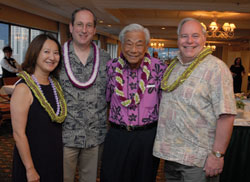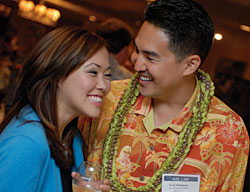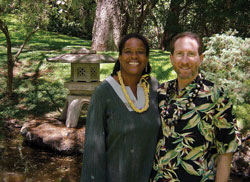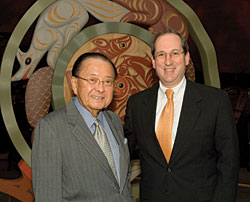
By Kathleen Kocks
When the American Bar Association
gathered in Hawaii in August for its annual conference,
attendees from GW Law showcased the school’s
excellence in several ways. These included two
ABA awards, a festive alumni reception in honor
of Sen. Daniel K. Inouye (D-HI), JD ’52,
and expert presentations by faculty members.

|

Dean Carol Mon Lee
of the William S. Richardson School of Law,
Dean Frederick M. Lawrence, former Chief
Justice of the Hawaii State Supreme Court
William S. Richardson, and Senior Associate
Dean Tom Morrison.
Ki’i Honu Images
|
Attracting more than 5,000 registered attendees,
the ABA conference ran from Aug. 3 through Aug.
7 in Honolulu at the Hawaii Convention Center.
With regular ABA committee and delegate meetings,
the conference included more than 1,200 events
with expert speakers providing timely information
on virtually every area of the law.
Excellence in Student Programming
Congratulations are due to GW Law’s Student
Bar Association, which took home two of the top
annual awards presented by ABA during the conference.
For the second year in a row, the ABA’s
Law Student Division named the SBA as the best
in a field of nominees from 22 other associations
at law schools nationwide. The award is based
upon the SBA’s overall organization; performance
by members as a team; total number and type of
programs; quality of and response to programs
and events; interaction with faculty members and
administration; how the student government voices
and addresses students’ concerns; and interaction
with the local legal and non-legal community.
The ABA also presented its SBA President award
to Eric Koester, JD ’06, who was selected
from a field of 23 other nominees. Last year,
Koester was the runner-up in the same contest.
The award is based upon overall leadership, ability
to organize programs, interaction and accessibility
with the student body, ability to address student
body concerns, interaction with faculty and administration,
representing student needs nationally, and relationship
with the broad community.
Koester also served as vice chair of the ABA
Law Student Division at the time of the conference
and helped organize and conduct the division’s
program of events. Koester is now an associate
at Heller Ehrman in Seattle. His activity within
ABA continues, now within the Young Lawyers Division’s
business law section.
“The ABA experience was really helpful
to me in terms of developing contacts around the
country. For example, I’ve visited around
20 law schools and met people with expertise in
many areas. This allowed me to learn from their
experiences as well,” Koester says.
The new SBA president, Sam Jammal, also is lending
his leadership skills to ABA’s Student Law
Division. He serves on the elections and resolutions
committees, and was elected in August to be one
of the division’s three delegates to the
House of Delegates, ABA’s policy-making
body.
“The SBA, its president, and all its officers
continue to make me and our Law School proud,”
Lawrence says. “I am very pleased that the
ABA recognized the hard work, organizational skills,
and social concerns that this organization provides
to our students on a daily basis. The SBA adds
much to the learning experience of our Law School
Community. Ultimately, one of the things that
makes our community of scholars, teachers, and
students so special is our collegial atmosphere.
The dynamic leadership of the SBA contributes
significantly towards maintaining that sense of
community, and it has served us well.
Honoring an American Hero
Taking advantage of the Hawaii venue, the Law
School hosted an alumni reception to honor one
of its most respected alumni on his home turf—Sen.
Daniel K. Inouye. The evening event, held Aug.
4, was co-hosted by GW Law and the University
of Hawaii Law School. Inouye is an alumnus of
both universities, receiving his BA from the University
of Hawaii in 1950 and his JD from GW Law in 1952.

Alumni from GW Law and the University of
Hawaii’s William S. Richardson School
of Law gathered to celebrate Sen. Daniel
K. Inouye, who earned a BA from the University
of Hawaii and a JD from GW Law. Hawaii Rep.
Scott Nishimoto, a graduate of the William
S. Richardson Law School, formerly served
as a staff member in Inouye’s Washington
office.
Ki’i Honu Images
|

|
The stage for the event was the elegant Plaza
Club in downtown Honolulu. More than 170 guests
from both schools came to show their appreciation
of the senator, meet new peers, and reacquaint
themselves with fellow alumni. It also was a rare
opportunity for alumni based in Hawaii to meet
with GW Law deans and faculty members, to share
memories, and to discuss improvements and changes
at the Law School.
Although Sen. Inouye was unable to attend the
reception, due to an important trip to China,
he was very honored by the event. To show his
appreciation, he took the time to create a personalized
DVD welcome presentation, which was shown during
the reception (see sidebar). Dean Frederick M.
Lawrence also gave opening remarks welcoming the
guests and expressing GW Law’s appreciation
for the many ways Sen. Inouye has supported the
school, as well as for his public service during
his two terms in the U.S. House of Representatives
and eight terms in the U.S. Senate.
In his remarks, Dean Lawrence shared some exciting
news with the GW Law community.
“It was my pleasure to announce at the
reception the Law School’s intention to
raise a Chair in honor of Senator Inouye and his
late wife, Margaret. The Chair will be dedicated
to the role of law in addressing the particular
concerns of groups within a multicultural society,”
Lawrence says.
“Senator Inouye, a war hero and a distinguished
legislator, is a shining example of a public servant
committed to using all aspects of the law to address
issues of concern to Hawaiians, Native Americans,
and other indigenous populations throughout America.
We are proud that he is an alumnus of our Law
School and even prouder to have a permanent Law
School Chair to honor his remarkable career and
achievements.”
Faculty Members Share Expertise

|

Senior Associate
Dean for Academic Affairs Stephen L. Schooner
visited the University of Hawaii’s
William S. Richardson School of Law campus
during the ABA annual conference. He is
joined by William S. Richardson School of
Law Professor Danielle Conway-Jones, LLM
’96, director of the Hawaii Procurement
Institute, who will travel to Australia
this year on a Fulbright.
|
As the conference got into full swing, four GW
Law professors were among the expert speakers,
bringing their perspectives to five panels.
On Aug. 3, Stephen Saltzburg organized and moderated
“Guantanamo Trials End FOR NOW: The Future
of Military Tribunals.” Founder of the Law
School’s Litigation and Dispute Resolution
master’s program, Saltzburg is the chair-elect
for ABA’s Criminal Justice Section, a delegate
to ABA’s House of Delegates, and was formerly
the deputy assistant attorney general in the Justice
Department’s Criminal Division and formerly
the associate independent counsel in the Iran-Contra
investigation.
The session, which attracted more than 150 attendees,
included five speakers familiar with the topic:
a criminal defense lawyer, a military lawyer from
the Army criminal law division, a Wall Street
Journal reporter, an ABA observer who had
been at Guantanamo, and Saltzburg. The panel discussed
the military’s procedures in prosecuting
detainees at Guantanamo, and this session was
considered a highlight of the conference. The
general sentiment at the session’s conclusion
was that the Guantanamo issue has done a lot to
damage America’s stature in the international
community, Saltzburg says.
The second session with GW Law participation
was “Historical Trial: The Massie Case.”
This was a reenactment of an infamous trial in
which five native Hawaiians were accused of kidnapping
and raping an American woman, but claimed they
were innocent and were acquitted. One of the accused
was then murdered by criminals hired by relatives
of the victim. The murderers and relatives involved
were subsequently tried and found guilty, but
received a one-hour sentence, served in the judge’s
chambers. The case stirred up many issues regarding
race, class, intimidation, and political power.
The session included a moderator; Hawaii Lt.
Gov. James R. Aiona Jr. as judge; three attorneys
representing prosecutors and defenders; a psychiatrist;
and a forensics expert—James E. Starrs,
professor of forensic science.
Starrs is the David B. Weaver Research Professor
of Law. His dual expertise and compelling writing
style have earned Starrs some fame in the two
areas.
“I presented the forensic materials for
and against a conviction of the five persons accused
of the rape. I also gave out materials describing
the technology available at the time of the trial,
which was 1932, and the technology we have available
today,” Starrs explains. “The event
attracted a huge crowd, with standing room only,
and it was a very good visual and animated presentation.
As to the overall conclusion, we asked the audience
to decide and all voted to acquit the accused
men.”
Starrs has presented this type of event at the
ABA conference for the past five years. Last year,
the session covered the Haymarket Riots in Chicago
and a previous year covered the mysterious death
of Meriwether Lewis.
Professor Cynthia Lee moderated the third session
with GW Law participation, “Multicultural
Perspectives on Gender, Race, and Crime in Post
9/11 America.” Lee is a member of the American
Law Institute and an expert in the areas of criminal
law, criminal procedures, and crimes of passion.
She is also of Asian descent and has done research
on issues involving gender, race and culture.
The session’s three speakers gave 20-minute
presentations on many different areas. One speaker
argued for allowing cultural evidence as a way
for immigrant and minority defendants to justify
their actions. Lee says attendees were intrigued
by the idea, but also concerned about the possibility
of people being able to use their culture to escape
punishment for their crimes.
Lee also moderated a second session titled “Mothers
(and Grandmothers, Aunts, and Sisters): Preparing
the Next Generation of Multicultural Women Attorneys.”
During this session, Kay Hodge, chair of ABA’s
Commission on Racial and Ethnic Diversity in the
Profession, talked about the importance of getting
members of minority groups into the pipeline—college,
law school, and then successful careers.
“This was a terrific session, very motivating,”
Lee says of the event, which attracted about 30
attendees. “We had three pairs of attorneys
who are mentors and their mentees: a current law
student, a recent graduate and a junior associate.
I asked the panelists questions, they answered,
then the audience chipped in. Most of the discussion
was about why women attorneys of color should
mentor and ways they can do it.”
Christopher Yukins spoke at a session titled
“Contracting in a Restructuring Marketplace:
Are You Ready?” This session dealt with
new rules in military procurement and speakers
also included senior Department of Defense lawyers,
private industry lawyers, and the past chairman
of ABA’s public contract law section.
Yukins is an associate professor of government
contracts law and the co-director of GW Law’s
Government Procurement Law Program.
“The purpose of the panel was to discuss
important emerging rules regarding military contracts
for complex weapon systems that are being overseen
by private contractors that are known as ‘lead
systems integrators.’ One example is the
Future Combat System, a huge military program
with Boeing as the lead,” Yukins explains.
“The lead’s role is to choose and
oversee the program’s subcontractors. They
are also now performing some tasks that were formerly
performed by government program managers.

Senior Associate Dean for Academic Affairs
Stephen L. Schooner visited the University
of Hawaii’s William S. Richardson
School of Law campus during the ABA annual
conference. He is joined by William S. Richardson
School of Law Professor Danielle Conway-Jones,
LLM ’96, director of the Hawaii Procurement
Institute, who will travel to Australia
this year on a Fulbright.
|

|
“The issue is: Do the leads have an inherent
conflict of interest because it is very likely
some of the subcontractors bidding for contracts
or hired in these complex programs will also be
competitors of the lead or of some of its divisions,”
Yukins says. “The panel’s general
consensus was that much more needs to be done
as the law catches up with a rapidly evolving
procurement industry.”
Broader Impact
Considering the awards, reception, presentations,
and reunion events in which GW Law was involved
during the conference, it is clear that the Law
School’s presence was felt by the ABA and
beyond.
Of special note are the strengthened ties between
GW Law and the University of Hawaii’s William
S. Richardson School of Law. Inouye, as a member
of both academic communities, thanked Dean Lawrence
and Dean Aviam Soifer of the William S. Richardson
School of Law for their support in his reception
DVD. He also reminded alumni of both schools that
coming together in the academic and professional
realms will help those who practice law “identify
peaceful ways for the citizens of the world to
live together.”
“The annual ABA meeting always provides
an opportunity for reflection, camaraderie, and
dealing with hard issues facing the legal community,”
Lawrence says. “I am pleased that GW Law
plays a prominent role in all of these areas.”
Students, alumni, faculty and staff members,
and administrators who participate in such external
events represent GW Law to the broader legal community.
In turn, they take the knowledge they gain at
such events back to Washington, further enriching
the Law School community in and outside the classroom.
The Call to Serve
Senator Daniel K. Inouye
By Laura Ewald

|

Sen. Inouye
and Dean Frederick M. Lawrence at
the Dean’s Dinner, held Oct.
20 at the National Museum of the American
Indian.
Dave Scavone
|
The attack on Pearl Harbor on Dec. 7, 1941,
forever changed the United States; though
it in many ways was the catalyst for unimaginable
tragedy, it also was the day America gained
a strong leader. Daniel K. Inouye was only
17 years old, but when the high school student
and Red Cross volunteer provided first aid
to civilians, it marked the first of his
countless acts of service to his home state
and his country.
In 1943, Inouye enlisted and joined the
Army’s 442nd Regimental Combat Team.
He became a platoon leader, sergeant, second
lieutenant, and eventually captain. Among
Inouye’s many heroic efforts, he helped
rescue a Texas battalion surrounded by German
forces in the French Vosges Mountains.
Later, in Italy, Inouye continued to lead
a platoon while sustaining severe injuries
that ultimately resulted in the loss of
his right arm. After his honorable discharge
in 1947, Inouye received the Distinguished
Service Cross, Purple Heart, and a dozen
other medals and citations. In 2000, he
received a Medal of Honor from President
Bill Clinton.
After graduating from the University of
Hawaii, and then GW Law in 1952, Inouye
began the political career he continues
today as one of the most senior members
of the Senate.
Inouye’s service to Hawaii began
before its statehood. After acting as deputy
public prosecutor for the city of Honolulu,
he was elected to the Territorial House
of Representatives in 1954, later winning
election to the Territorial Senate. When
Hawaii became a state in 1959, Inouye was
elected its first congressman. Elected to
the U.S. Senate in 1962, Inouye now is serving
his eighth consecutive term.
He is a champion for Hawaii, first bringing
its unique interests to the political forefront
during early statehood and continuing to
look out for its economy, health and human
services, and the protection of its priceless
natural resources today.
On a national and international level,
Inouye places an emphasis on diplomacy and
embracing cultural diversity. His experience
makes him a natural leader in efforts to
enhance the quality of life for military
personnel and their families. He is chairman
of the Defense Appropriations Subcommittee,
the Communications Subcommittee, and the
Indian Affairs Committee.
Inouye’s ties to Washington began
at GW Law, and those ties have improved
the District for those in and outside of
the GW community. He helped to establish
the Metro system and insisted on the installation
of its elevators to assist persons with
disabilities. He has advocated for the support
of GW Hospital, as its unique location and
services are an asset to leaders in Washington.
In addition to his decade-long service on
the GW Board of Trustees, Inouye helped
to plan an American Indian Policy Center.
Inouye also attends GW Law alumni events,
including this year’s Dean’s
Dinner. Dean Frederick M. Lawrence welcomed
Inouye and many distinguished alumni Oct.
20 at the National Museum of the American
Indian. The senator said he was pleased
to reconnect with fellow alumni as well
as faculty members and administrators. He
also expressed his gratitude at the Law
School’s announcement to raise a Chair
in his name.
The Chair will honor Inouye’s contributions
to Hawaii, the United States, and the University—and
also pays tribute to his late wife, Margaret.
Via a personalized DVD shown at the reception
held in his honor in Hawaii in August, Inouye
thanked community members of both GW Law
and the University of Hawaii’s William
S. Richardson School of Law for their continued
support. “I am honored to be part,
in some small way, of the ideals that these
two law schools embody,” Inouye said.
Always thinking of the big picture, Inouye
then turned words of gratitude into a call
to action. Calling to mind events of unrest
the world over, including the wars in Iraq
and Afghanistan, Inouye said legal knowledge
must be used for the greater good.
“We are reminded that it is the rule
of law that has enabled us to maintain an
ordered American society,” Inouye
said. “And, as attorneys, we are trained
not to abandon the rule of law but to adapt
it to more effectively address contemporary
circumstances, whether they be domestic
or international.”
As these words are written, the effects
of a devastating earthquake in Honolulu
are only beginning to be realized. But Hawaiians
have long known they have a compassionate
and effective advocate in Inouye. On his
home soil, the Senate floor, the battlefield,
or in the support of academia, Inouye has
proven a good man for any job. |
|